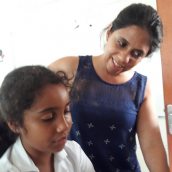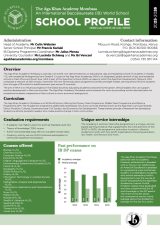Nuala Alibhai: Enriching educational and social programmes at the Academy
“The Academy through the International Baccalaureate curriculum has earned a positive reputation for its pluralistic approach, providing a holistic learning environment, developing leaders and achieving educational excellence.”
Nuala Alibhai is the Learning Student Support Coordinator for junior and senior schools at the Aga Khan Academy Mombasa. In this role, she works in collaboration with the Academy’s Principals to develop on-going systems of support for the student community. This includes providing leadership, management and advice on inclusion within the school to develop a differentiated programme that both challenges and meets the needs of students. She also ensures that the Student Support Unit effectively identifies students with any needs for additional support need, including gifted and talented, as well as vulnerable students.
She was born in Kenya where she acquired her basic education. She obtained her undergraduate degree from University College London as Speech and Language Therapist. Later she pursued her Masters in Inclusive Education, at the University of the West of Scotland where she completed her research in inclusive education at the early years level.
At the Aga Khan Academy Mombasa, Nuala works on a Value-based Education Programme, as a Curriculum Designer, through the Professional Development Centre at the Academy. She came to the Academy with a diverse background in inclusive education at a school, community and public policy level. “I was keen to apply this knowledge and skills within a mainstream school setting, to enable every student to achieve and succeed in school, career and life,” she remarks.
It has been Nuala’s endeavour to improve social outcomes through strategic planning and capacity building at the local government and community level. She is also passionate about designing and developing alternative educational programmes for vulnerable children, in order to ensure that they realise their full potential, so they can succeed in life as dignified equals. She has achieved both of these objectives by working for the past 15 years as a speech and language therapist and as an educational consultant in both the private and public sectors in Kenya and the UK.
Since September of 2016, Nuala has been with the Academy and appreciates how the Academy has provided her with opportunities to develop her teacher training skills and curriculum development skills. Nuala says, “I enjoy working with teachers who bring their hands on experience in the classroom and subject relevant knowledge to the table so we can enrich the educational and social programmes at the Academy.”
When asked what led her to choose a career in teaching, Nuala replies, “Karma! I started my career as a health professional but on my return to Kenya, I was sought after to do training, policy work and change management in the education sector. As my experience and confidence in the area grew, I began specialising in education. I have always seen myself working with children, so education was also an attractive choice.”
According to Nuala, the International Baccalaureate (IB) curriculum and the Aga Khan Academy strands set the Academy apart from other educational institutions. “It is one of the few schools in Kenya that offers the IB curriculum, which I consider to be the gold standard in education because of its holistic approach, academic rigor and emphasis on community service. The strands are added dimensions that help students make better sense of themselves, others, the world around them and the interconnectedness of all these elements.”
In terms of ensuring a climate of pluralism on campus where students from different racial, ethnic and faith backgrounds work together, Nuala feels the pluralism strand is already integrated into the lessons in the classroom, extracurricular activities after school and during out of school activities. “Collaboration skills are one of the approaches to teaching and learning, so students are exposed to activities that encourage and enable them to work with others who are different from them and have different opinions than them. They are encouraged to listen to others respectfully and consider their perspectives. This builds communication skills and empathy in students. These skills are then transferred to the student’s day-to-day interactions and not only in the classroom,” she reiterates.
When asked about the most rewarding aspect of teaching at Aga Khan Academy Mombasa, she replied, “The collaborative spirit and practice amongst the staff.” She further adds that there is appreciation and inclusion of every individual’s knowledge, skill and experience in decision-making. According to Nuala, strategies and unit plans are collectively produced not only to enhance the quality of the teaching and learning experience for the student, but also to allow the adult to grow, as a professional, in the process. “The teachers on the whole are approachable, warm and a joy to work with,” she comments. Parents are also involved as much as possible in their children’s education, she mentions. Parents get regular updates from the school on their child’s progress and well-being and are given recommendations of how to extend the learning and support beyond the walls of the school, she adds.
Nuala strongly feels that her position at Aga Khan Academy Mombasa has given her the opportunity to individualise the learning for every student. “My prayer is that this opportunity helps them become more self aware, reveal their talents and inspire them to make bigger strides forward with direction and confidence.”





